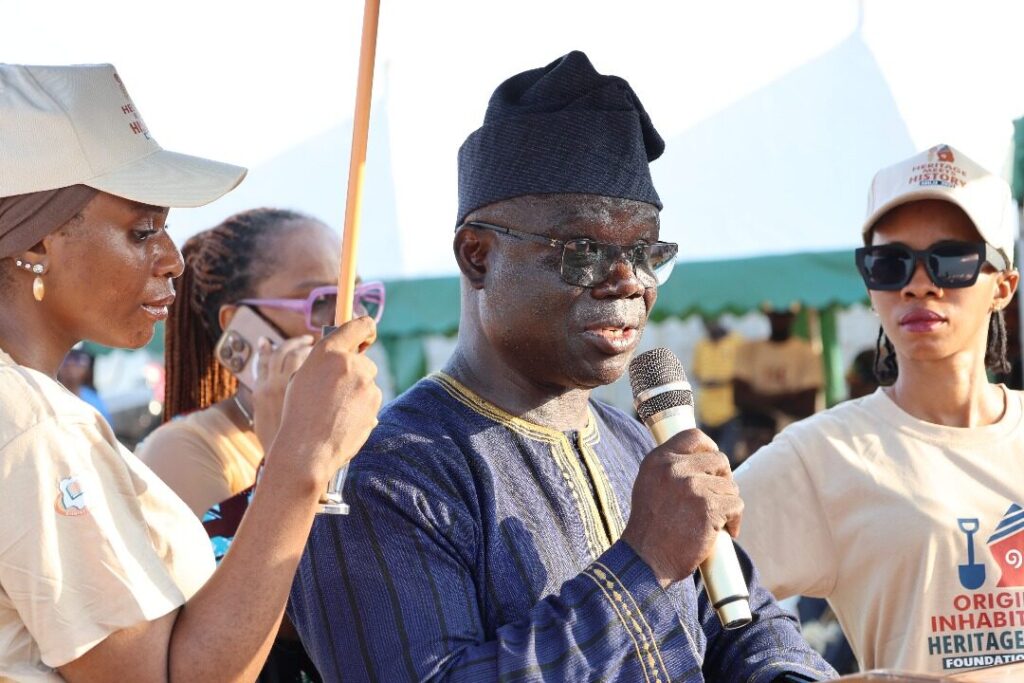Our Special Guest of Honor, Professor John Palfrey, President of the MacArthur Foundation, and your distinguished team, His Excellency Ambassador Gautier Mignot, Head of the European Union Delegation to Nigeria and ECOWAS, Your Royal Highness, Esteemed Traditional Rulers of the FCT, Our Co-host, Professor Matthew Adamu, Honourable Vice Chancellor of the University of Abuja, and members of the University community. Respected diplomats, government officials, revered elders, civil society leaders, valued partners, sub-grantees, beloved members of the FCT community, Ladies and gentlemen of the press
A Moment of Truth, A Monument to Justice
On behalf of the Board and Staff of CHRICED, I welcome you to this sacred moment—the groundbreaking of the Abuja Original Inhabitant Heritage Centre.
Today, we do not merely break ground. We break silence. We break cycles of exclusion. We break through the walls of invisibility that have long obscured the stories of Abuja’s Original Inhabitants.
This Centre is not just concrete and steel—it is a living monument to justice. A sanctuary of memory. A lighthouse for dignity. It is a bold declaration that Nigeria’s future must be built on truth, inclusion, and respect for those who first called this land home.
About the Heritage Centre
Our vision is clear: to create a world-class cultural institution that preserves, celebrates, and educates the public about the rich heritage of Abuja’s Original Inhabitants.
Our objective is urgent: to protect their identity, amplify their voices, and enshrine their democratic rights. This Centre will be a space for research, dialogue, civic engagement, and cultural expression—a place where history is not rewritten, but reclaimed.
This centre will serve as a bridge between culture and citizenship, between memory and justice. It is a place where the voices of Abuja’s Original Inhabitants—the first custodians of this land—will be heard, respected, and celebrated as essential to our national story.
Gratitude to Our Partners
We are deeply honoured to have Professor John Palfrey here today to formally lay the foundation of this Heritage Centre. John, your leadership continues to inspire a global movement for equity, justice, and accountable governance. Under your guidance, the Foundation has reaffirmed that philanthropy can be a powerful tool for social transformation and democratic renewal.
We are equally privileged to welcome Dr. Kole Ahmed Shettima, the Foundation’s Africa Director, a friend, mentor, and steadfast ally of communities striving for justice and inclusion. Dr. Shettima, your advocacy has elevated civic participation across Nigeria and continues to illuminate pathways for democratic reform across the continent.
We also warmly acknowledge the European Union Delegation to Nigeria and ECOWAS, whose steadfast commitment to democracy, human rights, and community empowerment has made the EU a trusted ally in Nigeria’s democratic journey. We look forward to deepening our collaboration with the EU and member states to jointly advance the protection of Indigenous People’s rights, cultural inclusion, and participatory governance.
To all members of the diplomatic and donor community, your presence affirms a shared belief that democracy must be both inclusive and just. We invite you to see this Heritage Centre as a platform for partnership; a space where we can collectively advance the values we hold dear; justice, dignity, and equality.
Culture As Compass, Democracy As Destination
Culture is the soul of a people. Democracy is the voice of that soul. When culture is recognized, democracy thrives. When heritage is erased, democracy falters.
Across Nigeria’s 250+ ethnic nationalities, culture shapes our identity, our dreams, and our relationships. Yet for too long, Indigenous communities have been sidelined—their rights neglected, their contributions ignored.
This OI Heritage Centre is not a museum of memory—it is an institution of justice. It affirms that cultural recognition is a democratic right. It restores dignity to those whose histories have been silenced.
Globally, the protection of Indigenous rights is a moral and political imperative. In Nigeria, it is a democratic necessity. The displacement of Abuja’s Original Inhabitants during the creation of our capital remains a stark reminder: development must never come at the expense of dignity.
Building a Legacy of Inclusion
Through this Centre, we reaffirm a simple truth: democracy cannot flourish where heritage is erased. The right to culture, identity, and inclusion is inseparable from the right to citizenship.
This project is a bridge—between tradition and modernity, ancestral wisdom and civic innovation. It will be a hub for research, dialogue, and engagement. A place where heritage fuels justice and inspires democratic practice.
Even as we confront historic injustices, we celebrate Nigeria’s cultural renaissance. Our music, films, fashion, and food have made us a global cultural powerhouse. And yes—our Ghanaian brothers have finally conceded: Nigeria has the best jollof!
But true strength lies not in global acclaim, but in justice at home. This Heritage Centre will ensure that our creative influence is rooted in authenticity—honouring the communities whose traditions inspire the world and dispelling the myth that Abuja was ever a “virgin land.”
Conclusion:
To the MacArthur Foundation—thank you for believing in this vision. Your investment in justice continues to empower communities to demand accountability and build inclusive governance.
To the University of Abuja—thank you for opening your doors to heritage, dialogue, and innovation. This partnership between academia and civic leadership is a model for lasting change.
To the Original Inhabitants of Abuja—this is your day, your Centre, your legacy. Your courage has transformed displacement into determination, and pain into power.
Therefore, as we lay this foundation, let us do so with conviction. Let this Centre become a place where culture informs policy, where democracy embraces diversity, and where justice is measured not by power, but by inclusion.
To our dear partners in the diplomatic community, including the European Union and other missions—join us in making this Centre a model of global solidarity. Let it be a space where knowledge meets justice, and where the defence of Indigenous rights becomes part of the broader struggle for democratic renewal.
Together, we can build a Nigeria—and an Africa—that is more inclusive, more just, and more humane.
Thank you, and may God bless the Federal Republic of Nigeria

